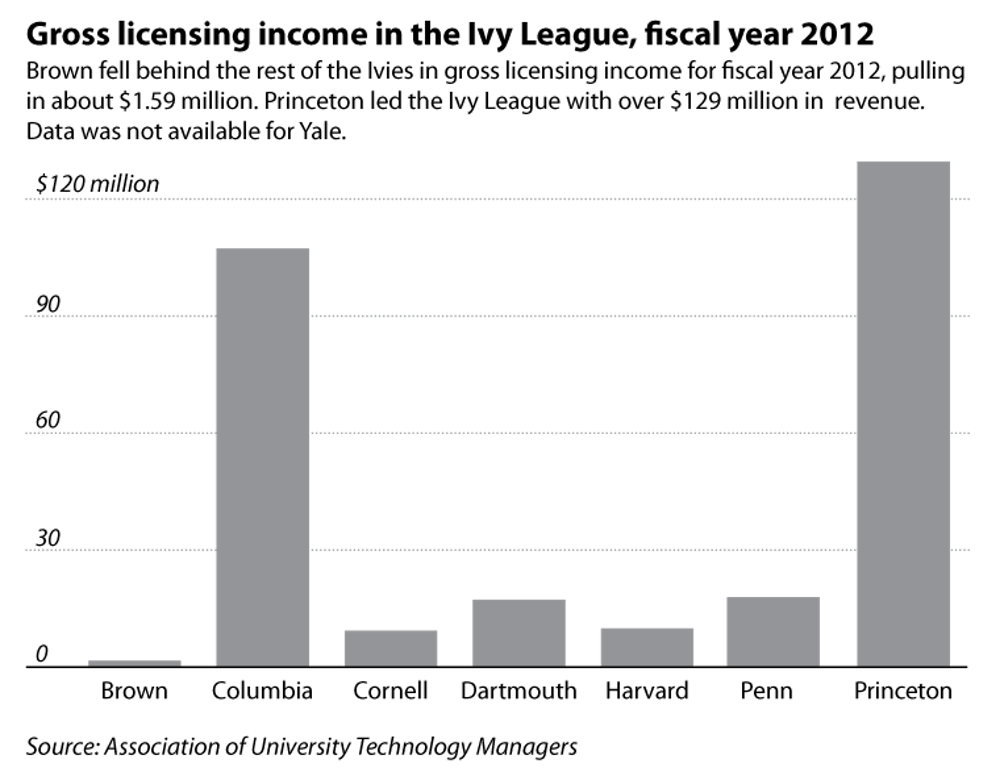The University’s gross licensing income — total royalties from research patents — rose approximately 44 percent to $2.3 million in fiscal year 2013, an increase from $1.6 million in 2012. The number of patents filed decreased slightly from 98 in 2012 to 90 in 2013, and the number of patents issued fell from 15 to nine, said Katherine Gordon, managing director of the Technology Ventures Office.
The 2013 increase, though, was not as high as the previous year’s change — total royalties spiked 65 percent from fiscal year 2011 to fiscal year 2012.
The office works with “researchers (to) identify novel innovative technologies that (it thinks) can be patented and then form the basis for commercialized ventures that can be partnered with industry,” Gordon said.
She added that the office has limited control over the number of patents issued on a yearly basis because the process can take a number of years after the initial filing. “I kind of view the process as the planting seeds for the future,” Gordon said.
Among its Ivy League peers, the University received the lowest amount of gross licensing income in 2012. Princeton led the way with $129,617,625 in adjusted gross income in fiscal year 2012, according to the annual Association of University Technology Managers survey. Data are not yet available for 2013.
Yearly licensing income includes revenue from all research patented by a university, including patents from previous years, Gordon said.
Derek Stein, associate professor of physics, who received a patent for his research applying condensed matter physics to biodiagnostics, said the Technology Ventures Office was a helpful resource throughout the process.
The office, which engages faculty members early on to facilitate the development of patentable ideas, assisted Stein with filing his patent, providing patent lawyers and being “proactive in trying to find an industrial partner in sponsoring this research … who would be interested in paying licensing rights for this technology,” he said.
Stein currently partners with Oxford Nanopore Technologies Ltd., a company that is “trying to commercialize a set of technologies based on small holes for sequencing DNA,” he said.
Edith Mathiowitz, professor of molecular pharmacology, physiology and biotechnology, said that from the beginning of her career, she “really saw the value of filing patents.” Mathiowitz, whose research revolves around drug delivery, said she has submitted more than 75 patents and was recently elected to the National Academy of Inventors.
One reason for faculty members to file patents is to protect ideas that have commercial potential before publishing papers, at which point the research becomes public knowledge, Mathiowitz said.
Industrial companies typically do not provide funding to researchers whose ideas are unpatented because of concerns that the research could be legally used by competitors, Stein said.
Mathiowitz said she sees a stark difference from what the process was like 23 years ago, when she first arrived at Brown. “Very few faculty were interested in patenting” at the time, because they thought if they patented their research, they would be unable to publish their papers, she said. Once faculty members discovered how the process works, more became interested in patenting their work because “funding is so hard to get these days” from the National Institutes of Health, she said.
She credits the University with educating the faculty but would like to see the Technology Ventures Office grow in the future and get more professors involved.
“This is definitely an avenue” for the University to grow revenues, Mathiowitz said.
A previous version of this article misidentified Derek Stein's position. He is an associate professor of physics, not an assistant professor of physics. The Herald regrets the error.

ADVERTISEMENT




